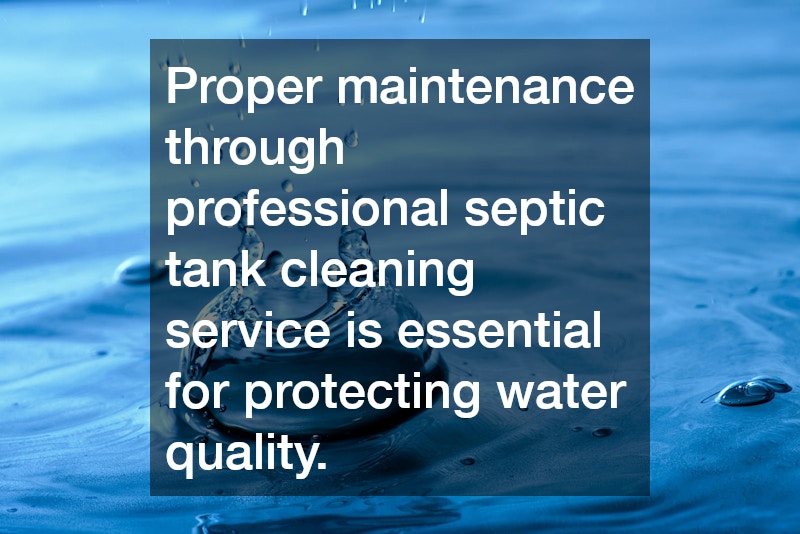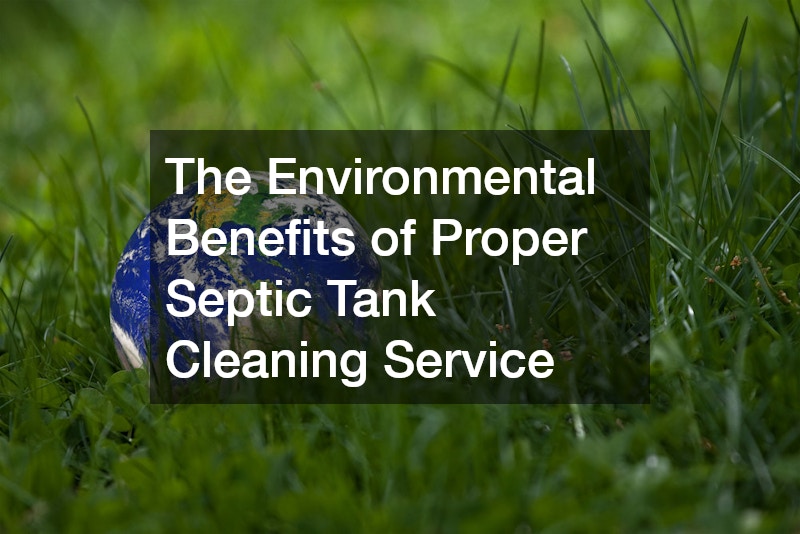A well-maintained septic system doesn’t just protect your home – it also plays a vital role in environmental health. Using a professional septic tank cleaning service helps ensure that your wastewater is treated properly before it enters the surrounding soil and groundwater. When systems are neglected, the consequences can be far-reaching, not only for property owners but for entire communities and ecosystems.
Understanding the environmental impact of septic systems highlights the importance of routine care and responsible waste management.
Preventing Groundwater Contamination
One of the main environmental concerns with poorly maintained septic systems is the risk of contaminating groundwater. Septic tanks are designed to separate solid waste from liquid effluent, which is then filtered through the soil. If the tank becomes too full or clogged, untreated wastewater can seep directly into the ground without proper filtration.
This can lead to harmful bacteria, viruses and chemicals entering groundwater supplies. In rural and regional areas, many households rely on wells or bore water for drinking, so the risk of contamination is a serious public health issue.
Scheduling regular septic tank cleaning service prevents overflows and leaks, helping keep groundwater sources safe and clean.
Protecting Local Waterways and Ecosystems
When wastewater escapes a failing septic system, it can flow into nearby streams, rivers or lakes. This not only affects water quality but also disrupts the balance of natural ecosystems. Excess nutrients from household waste, such as nitrogen and phosphorus, can cause algal blooms, which reduce oxygen levels in the water and harm fish and other aquatic life.
Over time, these blooms can lead to dead zones – areas where few species can survive due to low oxygen. Proper septic tank cleaning service reduces the risk of nutrient overload, helping protect local waterways and the diverse species that depend on them.
Healthy water systems support everything from native plants and animals to agricultural use and recreational activities.
Reducing Soil Pollution
A neglected septic system can result in solid waste and sludge escaping into the soil, which can damage the natural composition and fertility of the land. Chemicals from cleaning products, personal care items and pharmaceuticals that enter the tank may also leach into the soil if the system is compromised.
Contaminated soil not only affects plant growth but can also transfer harmful substances to animals and humans through food and water. Ensuring your septic system is functioning properly through scheduled cleaning helps minimise the risk of long-term soil pollution.
A healthy septic system keeps waste where it belongs – in the treatment process, not in the ground.
Supporting Sustainable Waste Management
Using a septic tank cleaning service is part of a larger commitment to sustainable living. A well-maintained system can function effectively for decades, reducing the need for replacements, major repairs or emergency services. Regular cleaning and inspection extend the lifespan of the system and help reduce the demand on municipal treatment facilities in areas with hybrid infrastructure.
In some areas, waste removed from septic tanks can be treated and reused for purposes such as soil conditioning or industrial applications. By managing your household waste responsibly, you contribute to broader efforts toward environmental conservation and resource recovery.
Small decisions at the household level can have a big impact when repeated across communities.
Minimising Greenhouse Gas Emissions
When septic systems fail or overflow, the organic waste that enters the environment can produce methane, a potent greenhouse gas. Methane emissions from untreated waste contribute to climate change and represent a growing concern in both residential and industrial waste management.
Proper cleaning and treatment of septic systems reduce the release of methane by ensuring waste breaks down in controlled environments rather than in open soil or waterways. Professional cleaning services use appropriate techniques to contain and dispose of waste without contributing to atmospheric pollution.
Taking care of your septic tank is one way to lower your home’s environmental footprint and reduce your contribution to global emissions.
Promoting Healthier Communities
The environmental benefits of regular septic tank cleaning service go hand-in-hand with public health. By preventing leaks, overflows and contamination, you also reduce the risk of disease transmission and exposure to harmful pathogens. Children, elderly individuals and those with weakened immune systems are especially vulnerable to illnesses caused by polluted water or soil.
Clean, safe environments allow communities to thrive. Schools, parks, businesses and homes all depend on reliable waste systems to maintain hygiene and wellbeing. When everyone does their part, the collective benefits are wide-reaching.
Using a reputable septic tank cleaning service is not just about convenience – it’s about caring for the people and environment around you.
Septic systems might be hidden underground, but their impact reaches far beyond the boundaries of your home. Proper maintenance through professional septic tank cleaning service is essential for protecting water quality, soil health and the surrounding ecosystem. It reduces pollution, limits the spread of harmful bacteria and contributes to the overall sustainability of your household and community.
While it may be easy to overlook what happens after the water goes down the drain, taking action to maintain your septic system ensures you’re doing your part to protect the environment. A simple service call today can prevent major environmental consequences tomorrow.



